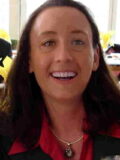Gröhn Group
Prof. Dr. Franziska Gröhn
Section
Physical Chemistry
Research areas
Molecular materials:
Energy
Novel multi-component materials for solar energy conversion through self-assembly
Photocatalysis
Structure-function relationships of novel nano-objects
Molecular materials:
Information
Light-switchable nanosystems
Ultrasound-triggering
Particle shape as information storage
Multi-switchable nanostructures through self-assembly
Molecular materials:
Sustainability
Developing principles for the defined synthesis of quantum dots and metal nanoarticles in water at room temperature
Selective photocatalysis in aqueous environment
Recycable structures through self-assembly
Making new structures and functions through self-assembly without the need for extended organic synthesis
Molecular materials:
Life science
Developing novel concepts for triggerable drug delivery with supramolecular nanoparticles
Interaction of proteins and peptides with other molecules
Nanostructure characterization of bio and biomimetic systems

